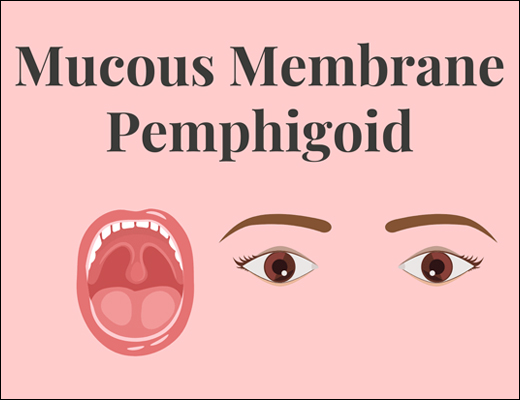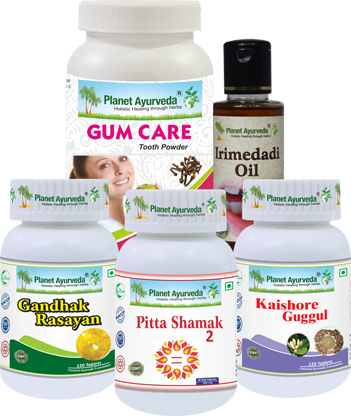What is Mucous Membrane Pemphigoid & It’s Ayurvedic Treatment with Herbal Remedies
Abstract
Mucous membrane pemphigoid (MMP) is a chronic and rare autoimmune disease that causes lesions in the form of blisters on mucous membranes of the body. The oral mucosa is mostly affected in approx. 85% of patients, conjunctiva in 65% of patients, skin and nasal mucosa in 30% and genital area in 20%. The incidence of MMP in oesophagus and larynx is comparatively low, i.e., around 10%. In chronic mucosal inflammation, pain, scarring and significant morbidity is seen due to destruction of tissues and functional limitation in the body. This article discusses clinical aspects of MMP in depth.

Introduction
Mucous membrane pemphigoid is a diverse group of chronic, autoimmune subepithelial blistering diseases which usually involves the mucous membranes of mouth and eyes and other areas like nose, skin, throat, anus, genital organs and especially, the head and neck region. MMP occurs when the immune system attacks the mucous membranes, causing blisters and sores. It is also known as cicatricial or oral pemphigoid. However, it is not just limited to the oral cavity. If it affects the conjunctiva, it is called ocular pemphigoid.
Etiopathology
This disease results from an overactive immunity which starts attacking against one’s own body tissues. More specifically, the proteins of the mucous membranes and autoantibodies react with each other resulting in blisters. Autoimmune conditions do not have a specific cause.
Risk Factors
- Sex: MMP affects women more often than men with a ratio of around 2:1
- Age: Incidence is more inclined towards the elderly population between 60-80 years with peak incidence being around 70 years of age
Symptoms
- Pain
- Itching
- Bleeding if blister gets eroded
- Impairment or loss of vision
- Difficulty eating if oesophagus is involved
- Nasal bleeding if nasal membrane is involved
- Unable to breathe if trachea is involved
Signs
- Formation and erosion of blisters
- Conjunctivitis
- When mouth is affected, blisters are first formed on the gums of teeth
- Scarring
- Swelling
- Adhesions in organs like oesophagus, vagina etc.
Complications
MMP can exhibit some serious complications like:
- Blindness
- Compromisation of the air pathway of the body. For e.g. If membrane of the larynx is affected it can result in severe obstruction and can instantly become life-threatening as the patient will be unable to breathe.
- Formation of stricture on the mucosal membranes.
- Scarring of mucosal membrane.
Diagnosis
Diagnosis is confirmed through:
- Physical examination of blisters and resulting scars.
- Examination of tissue samples under microscope.
- Sometimes, multiple biopsies are done by collecting the ulcerated tissue of the blister.
- Surrounding tissue areas of the blisters are also taken to detect antibodies on the skin.
- MMP DAI or mucous membrane pemphigoid disease area index is a score for assessing the severity of the disease.
Treatment
- The primary goal of the treatment of Mucous membrane pemphigoid is to slow down the progression of the disease and stop blister formation. This will promote healing and prevent scarring.
- Treatment usually involves corticosteroids or immunosuppressants, antibiotics (e.g. tetracyclines) and other anti-inflammatory drugs.
- Strategies can vary depending on the location of blisters and severity of the disease e.g. topical steroids may suffice as a first line of treatment in mild MMP of oral mucosa. However, systemic medication is administered in more severe stages or in case of multiple locations.
- On the basis of organ involved:
- Eye – Corticosteroid eyes drops, surgical intervention in case adhesions. Oesophagus or respiratory pathway – Semi-solid diet, dilation of strictures.
- Mouth, Nose and skin – Topical steroids, steroid injection, DMARD mouthwash.
- Genitalia – Corticosteroid ointment, oestrogen cream for vagina, use of vaginal dilators for adhesion prevention.
- Wound care is extremely important.
Ayurveda On MMP
In Ayurvedic science, mucous membrane pemphigoid can be correlated with Visphota. It is a condition where blistering eruptions are seen. It mainly entails the vitiation of Pitta Dosha and blood (Rakta Dhatu) along with some involvement of Kapha Dosha.
Ayurvedic Etiopathogenesis (Samprapti)
Excessive consumption of hot, dry, sour and pungent foods can aggravate Vata and Pitta Dosha. These doshas contaminate the blood, skin and muscles producing fluid filled sacs on mucosal membranes of the body or the skin.
The mention of Visphota is seen in 7th chapter (Kushtha Chikitsa) of Chikitsa Sthana of Charak Samhita under skin diseases.
स्फोटाः श्वेतारुणाभासो विस्फोटाः स्युस्तनुत्वचः||
Reference – Charak Samhita, Chikitsa Sthana 7/25
According to the above shloka, the eruptions and pustules that have thin skin and white-reddish appearance are known as Visphota.
Ayurveda Line Of Management In Mucous Membrane Pemphigoid
- Fasting Therapy (Langhana) – Being an autoimmune disorder, Mucous membrane pemphigoid asks for digestion of ama (undigested toxin) present in body circulation. Fasting therapy will eliminate the toxins and make room for medicines to work.
- Emesis (Vamana) – Medicinal emesis helps to expel out the vitiated Kapha and Pitta dosha in the stomach.
- Purgation (Virechan) – Therapeutic purgation is Pitta specific. It works to eliminate the aggravated pitta in the bowels. It provides fast results in the presence of inflammation.
क्लेदे प्रपतति चाङ्गे दाहे विस्फोटके सचर्मदले|
शीताः प्रदेहसेका व्यधो विरेको घृतं तिक्तम्||
Reference – Charak Samhita, Chikitsa Sthana 7/134
This shloka states that in case of excessive secretion from blister lesions, sloughing of skin layer, burning sensation, eruptions and exfoliation of skin, herbal pastes (Lepa) with cold potency herbs should be applied, hot sudation, purgation and use of ghee made with with bitter tasting herbs should be administered.
- Herbal Paste (Lepa) – Application of cold potency, anti-inflammatory herbal pastes like Chandanadi Lepam. It contains herbs like Rakta Chandan (Pterocarpus santalinus) and Shireesha (Albizia lebbeck). It is effective in relieving burning sensation.
- Medicinal Treatment (Pacification) – In MMP, decoctions like Visphotahara Kashayam, Patoladi Kashayam, Nimbadi Kashayam are used that are anti-inflammatory and anti-infective in nature. Other medicines include Vidangadi churna, Vardhaman Pippali etc.
Diet In Mucous Membrane Pemphigoid
Beneficial Food
- Barley, old rice
- Bitter gourd, pointed gourd
- Green gram soup or porridge
- Orange lentils
- Neem
- A2 Cow ghee in moderate amount
Food to be Avoided
- Sour, citrus foods
- Mango
- Brinjal, okra, capsicum, cauliflower
- Non-vegetarian food
- Dairy products like curd, cottage cheese etc
- Friend and processed food
Herbal Formulations For Mucous Membrane Pemphigoid By Planet Ayurveda
Planet Ayurveda strives to bring pure and effective herbal solutions to everyone round the globe. It is a GMP and FDA approved company. The medicines and natural products provided are made under the guidance of MD Ayurveda Physicians. Here are some of the most effective herbal medicines used in Mucous membrane pemphigoid:
- Gandhak Rasayan
- Kaishore Guggul
- Gum Care Powder
- Pitta Shamak 2
- Irimedadi Oil
Products Description
1. Gandhak Rasayan
It is a natural Ayurvedic medicine containing Shuddha Gandhak (Purified Sulphur). Gandhak is widely used in skin problems. It is hot in potency and pacifies Kapha and Vata Dosha. It aids in purifying the polluted blood of the body in Mucous membrane pemphigoid patients. Its anti-toxic nature helps to eliminate toxins from the body. It improves the impaired digestive fire which is one of the main reasons for autoimmune disorders.
Dosage: 2 tablets twice daily with water after meals.
2. Kaishore Guggul
Kaishor Guggul is an ancient formulation that includes potent herbs such as Amalaki (Emblica officinalis), Guduchi (Tinospora cordifolia), Guggul (Commiphora mukul), Vidanga (Embelia ribes) etc. This herbal medicine will not just help cleanse the blood and improve skin health but also reduce pain caused by blisters. It has anti-ulcer, anti-inflammatory and immunomodulatory properties. It is antibacterial in nature making it helpful in preventing skin infections.
Dosage: 2 tablets twice a day with water after meals.
3. Gum Care Powder
The gum care powder by Powder by Planet Ayurveda is an effective remedy in oral pemphigoid. It is made from the powders of herbs such as Shunthi (Zingiber officinale), Haritaki (Terminalia chebula), Khadir (Acacia catechu), Lavang (Syzygium aromaticum), Poog (Areca catechu) etc. This powder contains a bioactive compound called Eugenol. It helps to reduce toothache and prevent infection. Its anti-inflammatory action may reduce redness and swelling around the gums. The presence of antioxidants like gingerol aid in reducing scarring.
Dosage: Massage your teeth and gums gently with 3-6 gm powder. Rinse the mouth with lukewarm water after 2-3 minutes.
4. Pitta Shamak 2
This herbal remedy by Planet Ayurveda contains extracts of Pittapapda (Fumaria indica) and Patol (Trichosanthes dioica). It works to pacify Pitta Dosha and help relieve burning sensation, itching, swelling and pain around the affected area. It helps reduce Ama (undigested toxins) in the body which will indirectly rectify the immunity. It helps heal stubborn wounds and improves skin complexion.
Dosage: 1 capsule twice daily after meals with water.
5. Irimedadi Oil
This is an oil based topical medication. It is made from herbs like Irimeda (Acacia farnesiana), Manjistha (Rubia cordifolia), Yashtimadhu (Glycyrrhiza glabra) etc. This oil reduces pain, tissue inflammation and controls bleeding from wounds. It also helps to counter infections. It is cold in nature. It helps tackle inflamed and infected gums. It has anti-ulcer and anti-bacterial properties. It improves skin quality and is effective in blood vitiated disorders.
Dosage: Local application.
Conclusion
Mucous Membrane Pemphigoid is a blistering condition affecting the mucous membranes of the body including the conjunctiva of the eye, inner lining of the nose etc. It is a rare autoimmune disorder. Early diagnosis of the disease can prevent permanent scarring. Modern treatment is symptomatic and limited with surgical intervention in complications. However, Ayurvedic herbs possess the capability to reduce pain and inflammation in blisters and provide satisfactory relief.





1 thought on “What is Mucous Membrane Pemphigoid & It’s Ayurvedic Treatment with Herbal Remedies”
Comments are closed.